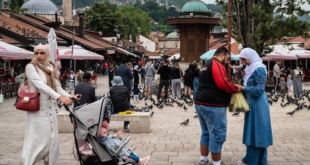The Appellate Chamber of the State Court of Bosnia and Herzegovina has acquitted Momcilo Mandic on all charges for war crimes against civilians and crimes against humanity.
Mandic was a justice minister in the government of the so-called Serbian Republic of Bosnia and Herzegovina during the Bosnian war. Radovan Karadzic, currently on trial for war crimes at the International Criminal Tribunal for the former Yugoslavia, was the president of the republic during the war.
Confirming the 2007 first-instance verdict, the court in Sarajevo acquitted Mandic today of responsibility for the attack by Serbian forces on the Staff Training Center of the Ministry of Internal Affairs in Sarajevo and of responsibility for the functioning of the penal and correctional facilities in Sarajevo and Foca.
The Appellate Chamber concluded that substantial proof was not provided that Mindic was responsible for the events that took place in the Foca, Butmir and Planjina Kuca facilities in the period when he was justice minister.
All three locations served as a detention centers for Bosniak and Croat civilians in 1992.
“The Appellate Chamber considers that it was logical for the First Instance Chamber to conclude that the Ministry of Justice and the Administration of the Serbian Republic of Bosnia and Herzegovina did not specifically express its responsibility for detainees, and therefore there is no reliable conclusion suggesting that indictee Momcilo Mandic, in his capacity as justice minister, had effective control over events and actions pertaining to the capture, detention and treatment of prisoners,” the Court of Bosnia and Herzegovina said.
Considering the count charging Mandic with the attack on the Vraca School Center, the Appellate Chamber ruled that this incident “does not fulfill the conditions of an armed conflict.”
The first-instance verdict ruled that because the attack on the Vraca Center happened on April 5, 1992, prior to the beginning of the armed conflict in Bosnia and Herzegovina, it “could not be characterized as an armed conflict but as part of an inter-ethnic conflict.”
“It cannot be determined, beyond reasonable doubt, that the indictee came to the Vraca Center in his capacity as Deputy Minister of Internal Affairs of the Serbian Republic of Bosnia and Herzegovina, with authority to issue orders to police forces,” the decision states.
The court considered it was necessary to present “convincing evidence pertaining to real command or control” of a group of people who committed the crimes described in the indictment in order to prove Mandic’s responsibility.
The Appellate Chamber ruled that “it is important and necessary to differentiate between various groups of people or chains of command if the activities of these groups or chains of command partially, but not fully, overlap.”
Mandic is the most senior former Bosnian Serb official against whom an indictment has been raised by the local prosecutor’s office for crimes against humanity and war crimes against civilians.
In front of the same court in 2007, in the Chamber for Organised Crime, he was sentenced to five years’ imprisonment for abuse of power during the time he was director and president of the managing board of Privredna Banka in Sarajevo, after the war.
Mandic is also mentioned in the indictment of Radovan Karadzic issued by the International Criminal Tribunal for the former Yugoslavia. The former Bosnian Serb president is indicted for war crimes committed during the war in Bosnia and Herzegovina.
According to the Karadzic indictment, Mandic was a member of a joint criminal enterprise in cooperation with Karadzic and other military and political leaders of Republika Srpska.
These allegations were not part of the indictment against Mandic filed before the court in Sarajevo. The Hague Prosecution has invited him to testify against Karadzic as one of the first 30 witnesses.
 Eurasia Press & News
Eurasia Press & News



